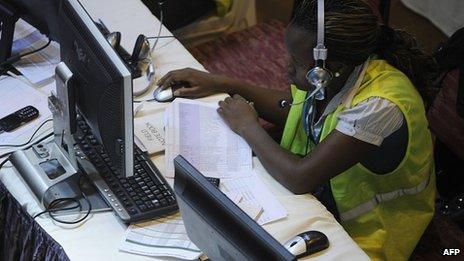Kenya election: 'Tech hub' hopes take polling day blow
- Published

Kenya had pinned its hopes of a cleaner vote this year on new technology
On polling day it was the biometric voter-identification kits that failed. Then, about 36 hours into the counting process, the electronic transmission system shuddered to a halt.
This election will be remembered as the poll where paper trumped digital.
The failure of the high-tech biometric kits had, by and large, one distinctly low-tech cause: A lack of electricity at polling stations. As laptops ran out of power, election officials went back to the paper register.
The failure of the digital transmission system is more mysterious. It was designed to communicate results in real time, from polling stations around the country to a national tallying centre in Nairobi.
At first the IEBC, Kenya's electoral commission, said the system may have been overloaded.
But technology experts dismissed those suggestions: the concept was based on SMS-messages, containing relatively small amounts of digital information.
"One of the main flaws was that people out in the field had trouble synching the data," says Erik Hersman, a Nairobi-based technology blogger and co-founder of Ushahidi, an open-source website set up to map violence after the last election five years ago.
It is possible the fault lay with the software on the handsets.
Or it could simply be that officials at the polling-stations themselves did not know how to use the technology.
But Mr Hersman says playing the blame-game at this stage is not helpful: "What went wrong and who did what is not important.
"What's important is understanding the problem so that credibility can be maintained."
On Thursday, the chairman of the IEBC, Issack Hassan, said a bug had been identified which had multiplied the number of rejected ballots by a factor of eight. But he could not provide clarity on why the whole system had so spectacularly failed.
And that lack of clarity left the public speculating.
There were suggestions that the server could have been hacked into.
The IEBC told the BBC it could not rule out a security breach. But other observers said they thought the fault was more likely to be some kind of technical error, as yet unidentified.
Embarrassment
In February, Kenya's Star newspaper highlighted what it said were potentially serious flaws, external in the technology.
The Financial Times reports that the head of Kenya's leading mobile phone company, Safaricom, wrote to the IEBC weeks before the poll to warn of shortcomings in the system.
Safaricom, which is part-owned by the UK company Vodafone, provided the network for the electronic transmission system, but said it was not responsible for the system's breakdown.
Mr Hersman says that part of the problem was a lack of transparency about the system in the run-up to the vote: "How [the system] works and who it was tendered to, should have been known months ago."
And so, when things went wrong, technology experts were left scratching their heads.
Mr Hersman adds: "[On Tuesday] I'm asking: 'How does this system work?' I don't even know how it works.
"We started following the trail online and there's nothing available."
This high-profile flop is an embarrassment for the IEBC, as well as a blow to the reputation of a country positioning itself as an African tech hub.
The system was introduced with one main purpose: To eliminate the possibility of vote-rigging, and give the Kenyan electorate faith in the credibility of the count.
Its failure could end up having the opposite effect.